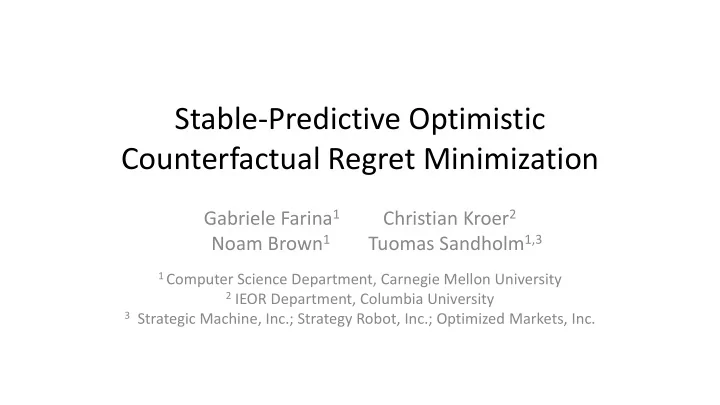

Stable-Predictive Optimistic Counterfactual Regret Minimization Gabriele Farina 1 Christian Kroer 2 Noam Brown 1 Tuomas Sandholm 1,3 1 Computer Science Department, Carnegie Mellon University 2 IEOR Department, Columbia University 3 Strategic Machine, Inc.; Strategy Robot, Inc.; Optimized Markets, Inc.
Recent Interest in Extensive-Form Games (EFGs) • EFGs are games played on a game tree – Can capture both sequential and simultaneous moves – Can capture private information • Application : recent breakthroughs show that it is possible to compute approximate Nash equilibria in large poker games: – Heads-Up Limit Texas Hold’Em [Bowling, Burch, Johanson and Tammelin, Science 2015] – Heads-Up No-Limit Texas Hold’Em • The game has 10 161 decision points (before abstraction)! • Finally reached superhuman level (after 20 years of effort) [Brown and Sandholm, Science 2017]
Counterfactual Regret Minimization (CFR) • Defines a class of regret minimizers • Specifically designed for EFGs: regret is minimized locally at each decision point in the game – By taking into account the combinatorial structure of the game tree, it enables game-specific techniques , such as pruning subtrees, and warm starting different parts of the tree separately • Convergence rate Θ 𝑈 −1/2 • Practical state of the art for approximating Nash equilibrium in EFGs for 10+ years (when used in conjunction with alternation and other techniques)
Optimistic (aka Predictive ) Regret Minimization • Recent development in online learning • Idea: inform device with prediction of next loss – Accurate prediction ⟹ small regret – Several optimistic/predictive regret minimizers are known in the literature, notably Optimistic Follow-the-Regularized-Leader (OFTRL) – Enables convergence rate of Θ 𝑈 −1 to Nash equilibrium in matrix games • Natural idea: can we combine CFR’s idea of local regret minimization with the improved convergence rate of predictive regret minimization?
Our Contributions • We present the first CFR variant which breaks the 𝚰(𝑼 −𝟐/𝟑 ) convergence rate to Nash equilibrium , where 𝑈 is the number of iterations. Our algorithm converges to a Nash equilibrium at the improved rate 𝑃(𝑈 −3/4 ) • Our algorithm is based on the notion of “ stable- predictive” regret minimizers , which are a particular type of predictive regret minimizers that we introduce • Our algorithm operates locally at each decision point . We show how different local regret minimizers should be set up differently at different parts of the game tree – Main idea: the stability parameter of the different regret minimizers drops exponentially fast with the depth of the decision point – Any stable-predictive regret minimizer (such as OFTRL) can be used as long as it respects the requirements on the stability parameter Poster: Pacific Ballroom #152 06:30 - 09:00 pm
Recommend
More recommend